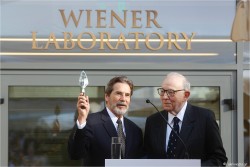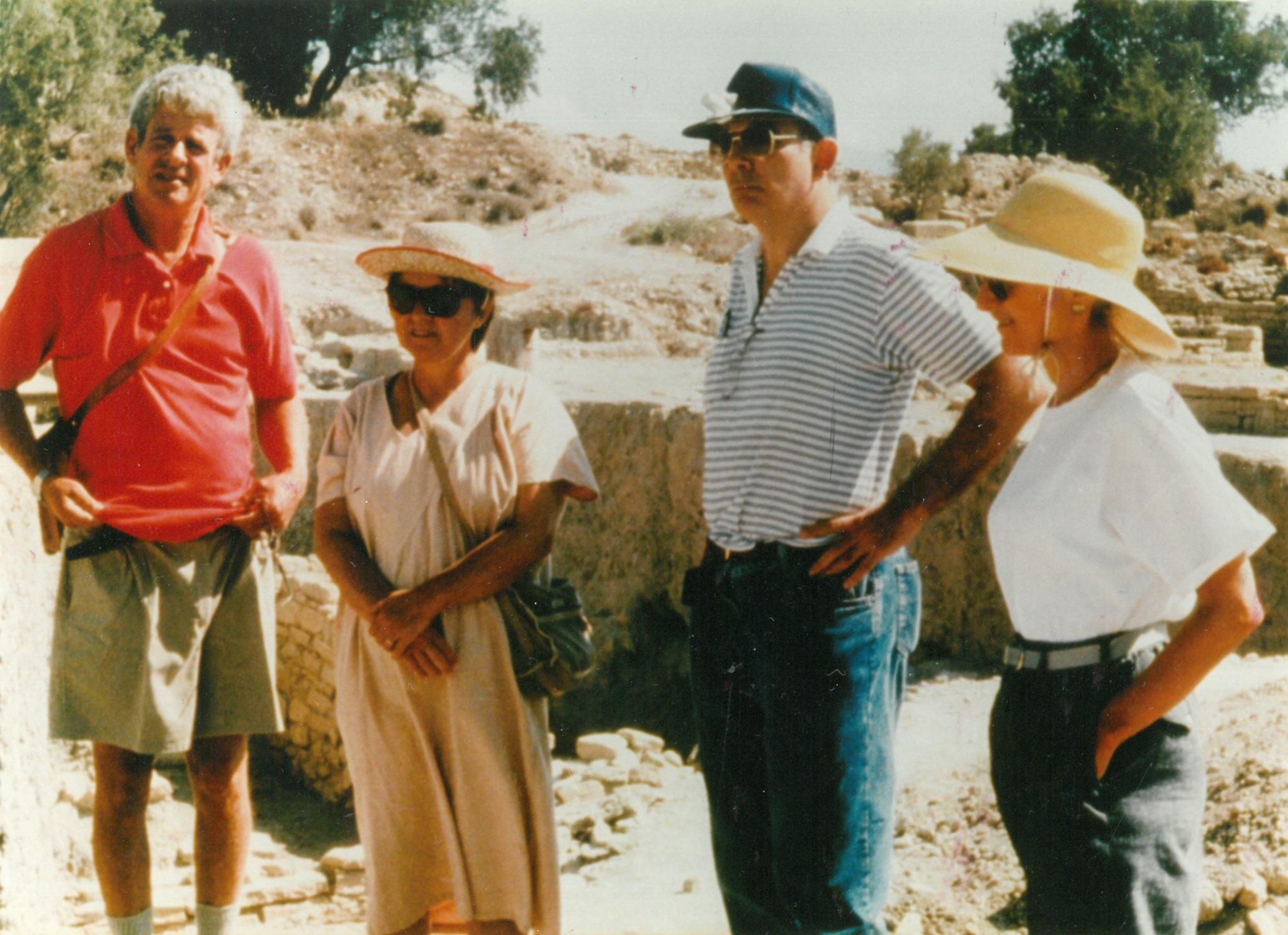Malcolm Wiener to be Awarded American School’s Athens Prize

Director Jim Wright and Malcolm Wiener at the opening of the new Lab in 2016
The Trustees of the American School of Classical Studies at Athens have named Malcolm Hewitt Wiener, Aegean prehistorian and Chairman Emeritus of the Trustees, as the second recipient of the School’s Athens Prize for “outstanding contributions to the advancement of knowledge of ancient Greece.” Wiener will accept the award on May 10, 2017 at the ASCSA Gala in New York City.
Malcolm Wiener’s prolific accomplishments are rooted in a love for archaeology that was inspired when, as a U.S. Navy lieutenant in the 1950s, he visited Greece and its spectacular archaeological sites. “I was hooked,” he recalls with a smile. Wiener went on to receive a J.D. from Harvard Law School, and to found several investment management firms, while also establishing himself in leading academic circles as an authority on Aegean Prehistory.
Wiener has published more than forty articles and has presented an abundance of international conference papers dealing with the rise, peak, and collapse of the Cycladic, Minoan, and Mycenaean civilizations in the Aegean, and their interconnections with Egypt, the Near East, Anatolia and the Western Mediterranean. His scholarship has been particularly influential in dealing with the challenges posed by radiocarbon dating (measuring the half-life of carbon-14 isotopes); in building its sister discipline of dendrochronology (counting tree rings); and in combining those scientific approaches with evidence from ancient texts, inscriptions, pottery, and astronomy. These studies have led to important conclusions about prehistoric chronologies. Wiener’s collected articles are scheduled for publication in a three-volume Kleine Schriften.
John F. Cherry, Joukowsky Family Professor of Archaeology at Brown University and a prominent Aegean prehistorian, especially respects Wiener’s commitment to staying abreast of the latest discoveries by personally visiting numerous excavations and knowing the most recent scholarship, which he says gives Wiener “a firsthand acquaintance with the state of the field that few of us can match.” Cherry elaborates, “I like to think of him as a sort of gadfly, or perhaps a conscience, for our field never ... swayed by orthodox opinion or academic fashions.... One always learns from him, since he commands such a masterly overview.”

Malcolm and Carolyn Wiener (at right) visiting the Kommos excavation on Crete with Joe and Maria Shaw
Wiener holds seven honorary doctorates, has been elected to eight learned academies, and last year was presented by the President of Greece with the Gold Cross of the Order of Honor of the Hellenic Republic. His work has also been honored in the U.S., where he has been an advisor to the U.S. Department of State on the International Convention of Illicit Traffic in Antiquities and was awarded the Bandelier Award for Public Service to Archaeology by the Archaeological Institute of America in 2013.
In addition to his own prolific scholarship, Wiener has been a strong supporter of other scholars, having established the Institute for Aegean Prehistory (INSTAP) in 1982 and the ASCSA’s Wiener Laboratory for Archaeological Science in 1992. In the summer of 2016, the Lab moved into a new state-of-the-art building on the ASCSA campus.
Takis Karkanas, Director of the Wiener Lab, marvels at Wiener’s foresight in creating a facility so far ahead of its time: “I admire Malcolm’s persistence in a vision that was initially thought of as too much of a dream. Imagine setting out—in 1992, in Greece, at a school of Classical Studies—to create a lab for archeological science," explains Karkanas.
Since 1992, the Lab has facilitated work primarily in the areas of human skeletal analysis, archaeobotany, archaeozoology, and geoarchaeology. James Wright, Director of the American School, praises Wiener’s comprehensive approach to supporting this research: “The significant fellowship funds he has provided have brought scholars from all over the world to the Lab to carry out their research. His aim has been to advance the scientific research into the past on the one hand, and to train the next generation of researchers on the other.”

Mr. Wiener and family examine the new equipment in the Lab.
The new lab makes possible all of this and more. Wiener predicts, “With the new facility we’ll be able to extend our operations dramatically.” Karkanas agrees: “We are seeking to establish the Lab as one of the most important scientific institutes engaged in archaeological science, globally. With the capacity, space, and equipment the new lab provides, this goal is within reach.”
The Institute for Aegean Prehistory (INSTAP) has awarded grants to archaeological researchers from around the globe. It remains an invaluable resource for scholars doing research and performing archaeological fieldwork pertaining to the Aegean from the Paleolithic period through the 8th century B.C. In addition to its grant program, INSTAP operates the Study Center for East Crete in Pacheia Ammos (offering research facilities, archaeological services, and a lecture series) and the INSTAP Academic Press in Philadelphia, which to date has published 62 monographs.
“Malcolm has done enormous good for the advancement of Greek archaeology and especially Aegean prehistory,” states Wright, himself an international authority in those areas, as is former ASCSA Director Jack Davis, who adds: “No one has made such a contribution to the growth and the development of the prehistory of Greece since probably the 1920s and the founding fathers of our field.”
In looking back at the tremendous influence Wiener has had in making the archaeology of the 21st century the truly interdisciplinary field it is, Wright muses, “Malcolm recognized, from at least the late 1980s, that there were specific problems archaeologists needed to solve that could only be done through collaboration with scientists. And the field of archaeological science has burgeoned over the last 30 years.” On a personal level, Wright observes, “Malcolm is an extraordinary individual, not merely because of his generosity, but because he has a deep passion for the study of the past itself.”